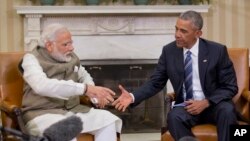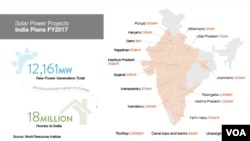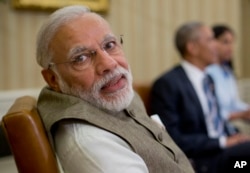President Barack Obama and India’s Prime Minister Narendra Modi highlighted the strong bonds between their two countries, the world’s two largest democracies, during a visit to the White House on Tuesday by the prime minister.
In an interview with VOA, Michael Kugelman of the Woodrow Wilson Center for Scholars said the rapport between the two leaders and the transformation in bilateral ties has been remarkable.
“There has been a sea change in U.S.-India relations over the course of the Obama administration," he said. "When President Obama first came to power, he really wanted to focus on the war in Afghanistan. He wanted to take ownership over that war. And that meant a very narrowly defined strategic focus on South Asia that really emphasized Afghanistan and, by extension, Pakistan. It didn’t really leave that much room for the relationship with India.”
But Kugelman said all that changed dramatically during Obama’s second term, and especially during the past two years, when the president got serious about his “pivot to Asia” and ended combat operations in Afghanistan. Kugelman said the Obama administration views India as the power most qualified to counterbalance China and its maritime aggressions in the South China Sea.
Good personal ties
Kugelman said there is definitely good personal chemistry between Obama and Modi, which is surprising, considering that until three years ago, Modi was barred from entering the United States after religious riots broke out in a state he governed.
Modi has come a long way, with official Washington celebrating him this time. He received a festive welcome and working lunch with the president and vice president at the White House, and an invitation to address a joint meeting of Congress on Wednesday.
The two leaders said they are committed to signing the Paris climate change agreement this year, although there was no formal announcement of a signing date, as some had hoped.
Obama thanked Modi for his serious commitment to clean energy. Sitting with Modi in the Oval Office after the first part of their meeting, Obama said: “A key priority for both of us is how to promote economic prosperity and opportunity, and poverty alleviation for our people. We continue to discuss a wide range of areas where we can cooperate more effectively in order to promote jobs, promote investment, promote trade and promote greater opportunities for our people, particularly young people, in both of our countries.”
U.N. Secretary General Ban Ki-moon welcomed the U.S. and India's "collaborative efforts to address climate change." In a statement he said the actions of Washington and New Delhi demonstrate "the growing momentum towards the rapid entry into force and successful implementation of the Paris Agreement."
Pool of talent
For his part, Modi pointed out that India has 800 million people younger than 35, adding: “The United States is well aware of the talent that India has. We and the United States can work together to bring forward this talent, and use it for the benefit of mankind, and use it for the benefit of innovations, and use it to achieve new progress.”
Obama and Modi also discussed security issues and strengthening global nuclear nonproliferation efforts.
On a personal note, Modi said: “I will always treasure the help and friendship that my friend President Obama has extended. It is something that I will always remember.”
But despite all the celebration, some U.S. lawmakers are still cautious, remembering how bad relations were between the two countries for decades.
The Tom Lantos Human Rights Commission, a bipartisan caucus in the House of Representatives, held a hearing Tuesday on human rights in India, focusing on concerns about the treatment of India’s poorest, the Dalit, formerly known as “untouchables,” and about human trafficking in some areas of the country.
One witness was John Sifton, Asia advocacy director with Human Rights Watch. He said India has made important strides in legal reforms in recent years, including protection for women and some of the country’s most vulnerable. But he called on India’s government to do much more to implement those reforms, and said Obama could be more outspoken about it.
"I think President Obama did raise the issues of religious discrimination, violence against religious minorities, in his own subtle way — oversubtle way," Sifton said. "I know the State Department has raised concerns. I would like those concerns to be raised more volubly, but they have been raised."
BJP assailed
Another witness, human rights activist and journalist Ajit Sahi, was very critical of Modi’s ruling Bharatiya Janata Party, or BJP, saying: "We should recognize it is the director, and not just the actor. It is the producer of human rights violations in India. It is the director of human rights violation because it springs from an organization which is fundamentally racist, an organization that has indulged in human rights abuses and violence for nearly 90 years."
An Indian official in Washington played down the human rights hearing, saying one society should not preach to another.
Modi is expected to receive a warm welcome Wednesday on Capitol Hill for his first address to a joint meeting of the House and Senate.















